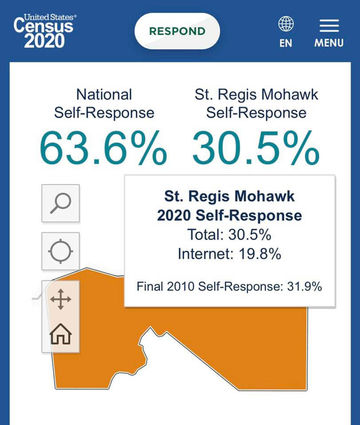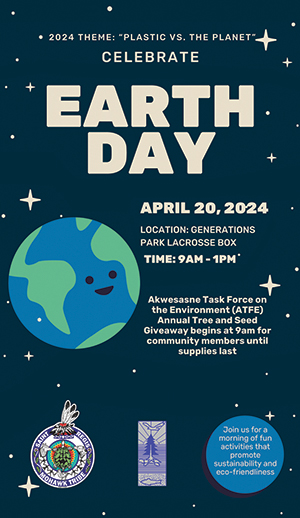Have you completed the U.S. Census?
Brendan White is on a mission. He is actively encouraging Akwesasronon to complete the United States 2020 Census. White has a lot going against him; a general distrust of the government, difficulty in filling out the application, and what if your name doesn't even fit in the box? Then there is the question of sovereignty - why would anyone fill out a census form for an outside government?
This is in every sense of the word, an obligation of the United States government to the people of Akwesasne. In order to be recipients of this, every person needs to be counted.
The Census will provide much needed revenue for every aspect of life in Akwesasne from pregnancy to early childcare to the Office for the Aging, from elementary school to post-secondary education, as well as infrastructure, housing, support for local farmers and equipment for the Hogansburg Akwesasne Volunteer Firemen.
The United States Census is completed every ten years. Started in 1790, by the turn of the century, the demographic, agricultural, and economic segments of the census collected information on hundreds of topics. Processing this data – by hand – kept their offices open for years. In 1902 Congress enacted legislation creating a permanent Census Office. The Census Bureau's offices went from one department to another and finally landed with the Department of Commerce in 1913. The 2020 Census ends on September 30, 2020.
White took his crusade "viral". At every chance, Brendan will post on his Facebook page an encouraging and informative post about why we should complete the U.S. Census.
In one post he wrote, "We only have 30 more days to count. The final population figure will determine funding for the next 10 years. If not for yourself, count for that family who needs a new home, someone looking to start a new business, a relative with vital healthcare needs, students needing a new school or college funding, for our volunteer firefighters to have essential lifesaving equipment, and countless other reasons. Complete your census at https://my2020census.gov"
Not even the Tribe has matched his enthusiasm for this. Granted, the SRMT posted on their Facebook page in August, "Congratulations! We matched our 2010 response rate, but it's nothing to celebrate as we undercounted ten years ago. Indian Country, including Akwesasne, is on track for a "historic undercount" that will severely curtail funding for tribal programs and disaster relief for the next decade. There is still time to respond and help our community! Please complete your census today at https://my2020census.gov or call 1-844-330-2020."
In normal times, and nothing is normal about 2020, the U.S. Census would end in October. This year, the Trump administration ordered an early end to the 2020 census. The abrupt change to the Census deadline had advocates concerned about the government's ability to obtain an accurate count of people in the U.S., especially those living in poverty, immigrants, and members of other historically undercounted groups – including Native Americans. Trump's move is intended to undercount, underfund, and underrepresent minority communities.
According to the New York Times, "And with 38 million households still uncounted, State and local officials are raising growing concerns that many poor and minority households will be left out of the count. Shortfalls could mean a severe undercount of the poor and people of color, and an overcount of whites - skewing both political representation and federal largess further away from already undercounted populations."
The 2020 count faces two crushing deadlines; compiling an accurate tally by Sept. 30, and to process and double-check the numbers in time to deliver population totals to the president by Dec. 31. The Census Bureau had asked Congress to push the delivery of population totals to April 2021 because of the pandemic. The remaining households are ever harder to reach, and the obstacles to reaching them are formidable.
According to NBC News in Dec. 2019, "In 2010, American Indians and Alaska Natives living on reservations were undercounted by 4.9 percent – that's more than twice the next undercounted group, African Americans, who saw an undercount rate of 2.1 percent. In 1990, the numbers were even more dire: 12 percent of Native Americans living on reservations were missed."
The pandemic, the mistrust, Trump, and many know the count isn't that structurally written for Native people. There are fundamental problems that show up such as what if your name is longer than the amount of characters you're given? What if you refer to the reservation by its local name, not the federal one? What if you write "Akwesasne," instead of "Saint Regis Mohawk Tribe? Then where will the funding go?
One young woman stated, "I can see my Rakeni getting to that point and saying, 'There isn't even enough room for me to put my name. I'm not gonna do it, it doesn't fit me, they didn't make it for me.'
Some believe being counted is an exercise of our tribal sovereignty - If we aren't going to be counted, how are they going to live up to fulfilling treaty rights?
Don't let that happen by completing your census today at https://my2020census.gov. #AkwesasneCounts






Reader Comments(0)